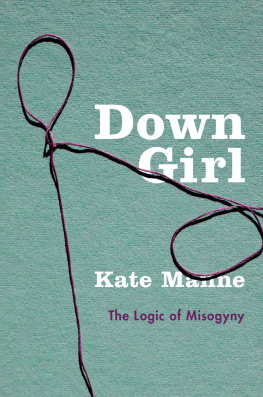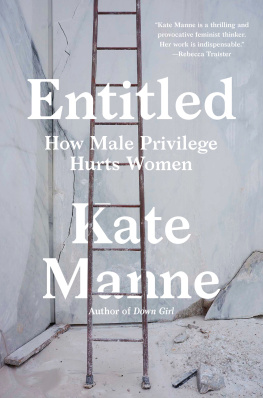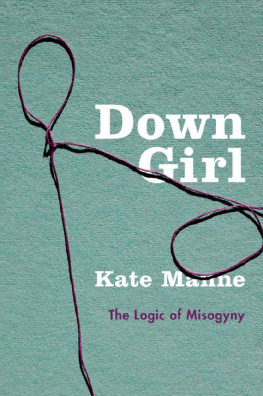Manne - Down girl: the logic of misogyny
Here you can read online Manne - Down girl: the logic of misogyny full text of the book (entire story) in english for free. Download pdf and epub, get meaning, cover and reviews about this ebook. City: London, year: 2019;2018, publisher: Oxford University Press USA - OSO;Penguin Books, genre: Romance novel. Description of the work, (preface) as well as reviews are available. Best literature library LitArk.com created for fans of good reading and offers a wide selection of genres:
Romance novel
Science fiction
Adventure
Detective
Science
History
Home and family
Prose
Art
Politics
Computer
Non-fiction
Religion
Business
Children
Humor
Choose a favorite category and find really read worthwhile books. Enjoy immersion in the world of imagination, feel the emotions of the characters or learn something new for yourself, make an fascinating discovery.
- Book:Down girl: the logic of misogyny
- Author:
- Publisher:Oxford University Press USA - OSO;Penguin Books
- Genre:
- Year:2019;2018
- City:London
- Rating:3 / 5
- Favourites:Add to favourites
- Your mark:
- 60
- 1
- 2
- 3
- 4
- 5
Down girl: the logic of misogyny: summary, description and annotation
We offer to read an annotation, description, summary or preface (depends on what the author of the book "Down girl: the logic of misogyny" wrote himself). If you haven't found the necessary information about the book — write in the comments, we will try to find it.
Manne: author's other books
Who wrote Down girl: the logic of misogyny? Find out the surname, the name of the author of the book and a list of all author's works by series.
Down girl: the logic of misogyny — read online for free the complete book (whole text) full work
Below is the text of the book, divided by pages. System saving the place of the last page read, allows you to conveniently read the book "Down girl: the logic of misogyny" online for free, without having to search again every time where you left off. Put a bookmark, and you can go to the page where you finished reading at any time.
Font size:
Interval:
Bookmark:


Oxford University Press is a department of the University of Oxford. It furthers the Universitys objective of excellence in research, scholarship, and education by publishing worldwide. Oxford is a registered trade mark of Oxford University Press in the UK and certain other countries.
Published in the United States of America by Oxford University Press
198 Madison Avenue, New York, NY 10016, United States of America.
Oxford University Press 2018
All rights reserved. No part of this publication may be reproduced, stored in a retrieval system, or transmitted, in any form or by any means, without the prior permission in writing of Oxford University Press, or as expressly permitted by law, by license, or under terms agreed with the appropriate reproduction rights organization. Inquiries concerning reproduction outside the scope of the above should be sent to the Rights Department, Oxford University Press, at the address above.
You must not circulate this work in any other form
and you must impose this same condition on any acquirer.
CIP data is on file at the Library of Congress
ISBN 9780190604981
eISBN 9780190605001
Moses describeth a woman thus: At the first beginning, saith he, a woman was made to be a helper unto man. And so they are indeed, for she helpeth to spend and consume that which man painfully getteth. He also saith that they were made of the rib of a man, and that their froward [difficult] nature showeth; for a rib is a crooked thing good for nothing else, and women are crooked by nature, for small occasion will cause them to be angry.
The Arraignment of Lewde, Idle, Froward, and
Unconstant Women, Joseph Swetnam, 1615
Guiltie, guiltie, guiltie. Guiltie of woman-slander, and defamation.
Swetnam the Woman-Hater, Anonymous, 1618
MR. MANNINGHAM. Admirable, my dear Bella! Admirable! We shall make a great logician of you yeta Socratesa John Stuart Mill! You shall go down in history as the shining mind of your day. That is, if your present history does not altogether submerge youtake you away from your fellow creatures. And there is a danger of that, you know, in more ways than one. [Puts milk on the mantel.] Wellwhat did I say I would do if you did not find that bill?
MRS. MANNINGHAM. [Choked.] You said you would lock me up.
Angel Street (or Gaslight), Patrick Hamilton, 1938
[L]aid on the grass how small, how insignificant this thought of mine looked; the sort of fish that a good fisherman puts back into the water so that it may grow fatter and be one day worth cooking and eating... But however small it was, it had, nevertheless, the mysterious property of its kindput back into the mind, it became at once very exciting, and important; and as it darted and sank, and flashed hither and thither, set up such a wash and tumult of ideas that it was impossible to sit still. It was thus that I found myself walking with extreme rapidity across a grass plot. Instantly a mans figure rose to intercept me. Nor did I at first understand that the gesticulations of a curious-looking object, in a cut-away coat and evening shirt, were aimed at me. His face expressed horror and indignation. Instinct rather than reason came to my help, he was a Beadle; I was a woman. This was the turf; there was the path. Only the Fellows and Scholars are allowed here; the gravel is the place for me. Such thoughts were the work of a moment.
When will women be human? When? asked feminist legal theorist, Catharine A. MacKinnon, in a 1999 essay.
Why do these patterns persist, even in allegedly post-patriarchal parts of the world, such as the contemporary United States, the United Kingdom, and Australia? The same can be asked about the many other kinds of misogyny this book will considerfrom the subtle to the brazen; the chronic and cumulative along with the acute and explosive; and those due to collective (or mob) activity and purely structural mechanisms, along with individual agents actions. Why is misogyny still a thing?to borrow a phrase from John Oliver.
Theres no doubt that, in these milieux, much progress has been made with regard to gender equality, following feminist activism, cultural shifts, legal reforms (e.g., laws against sex discrimination) and changes in institutional policy (e.g., affirmative action, whose chief beneficiaries in the United States have tended to be white women). Gains for girls and women in education have been especially impressive. And yet, as will emerge in these pages, misogyny is still with us.
The problems that persist, with some arguably on the rise, raise questions that are thorny, puzzling, and urgent. I believe that moral philosophy has a valuable role to play herealthough, ultimately, it will take a village of theorists to gain a full understanding of the phenomenon. My hope in this book is to make a contribution to understanding the nature of misogyny, both in terms of its general logic, and one (though only one) of its key dynamics in practice. This involves men drawing on women in asymmetrical moral support roles. (I restrict myself to the cultural contexts mentioned above, although welcome others to generalize, or amend and adapt, beyond this.)
What do these moral support relations amount to? Its helpful to think initially about the men who are the most privilegedin being, for example, white, het (i.e., straight), cisgender rather than transgender, middle class, and nondisabled. They hence tend to be subject to fewer social, moral, and legal constraints on their actions than their less privileged counterparts. We can then think of a more or less diverse set of women on whom such a man is tacitly deemed entitled to rely for nurturing, comfort, care, and sexual, emotional, and reproductive labor. Alternatively, she may represent the type of woman who might have served, or may be recruited, for such purposes.
Of course, just because someone has tacit social permission to lean on women in these and similar ways does not mean either that he would actually want to do so, or that he will succeed in so doing (thereby taking advantage of this possibility), even if he does. Similarly, even if the external constraints on his behaviour are less stringent for him than his less privileged counterparts, he may nevertheless observe these or similar norms, regarding himself as constrained as a matter of moral principle or conscience. But, in other cases, the paucity of such constraints and the presence of such entitlements will have an effect on the way he views and treats certain women within his social orbit: specifically, as owing him or his brethren her distinctively human services and capacities, much more so than vice versa.
These asymmetrical moral support relations may be instantiated in many different ways, including in intimate and relatively stable social rolesas his mother, girlfriend, wife, daughter, and so on. Alternatively, these relations may be instantiated in the workplace, position him as a consumer, or involve ad hoc encounters with the girls and women whose attention he may solicit by many different meansfrom catcalling to trolling on social media to mansplaining.
My view is that a significant amount of (though far from all) misogyny in my milieu serves to police and enforce these social roles, and extract moral goods and resources from such womenas well as protesting her nonappearance or supposed negligence or betrayal. And some (although, again, far from all) remaining forms of misogynyfor example, that which is directed at female public figuresis plausibly derivative from this one. It reflects a kind of deprivation mindset regarding women being giving, caring, loving, and attentive, as opposed to power-hungry, uncaring, and domineering. And it involves a jealous hoarding of certain positions of presumptive collective moral approval and admiration for the men who have been its historical beneficiaries. Women who compete for these roles will tend to be perceived as morally suspect in at least three main ways: insufficiently caring and attentive with respect to those in her orbit deemed vulnerable; illicitly trying to gain power that she is not entitled to; and morally untrustworthy, given the other two kinds of role violations.
Font size:
Interval:
Bookmark:
Similar books «Down girl: the logic of misogyny»
Look at similar books to Down girl: the logic of misogyny. We have selected literature similar in name and meaning in the hope of providing readers with more options to find new, interesting, not yet read works.
Discussion, reviews of the book Down girl: the logic of misogyny and just readers' own opinions. Leave your comments, write what you think about the work, its meaning or the main characters. Specify what exactly you liked and what you didn't like, and why you think so.








